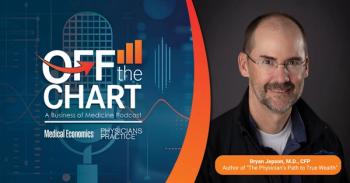
A Physician's First Death
Death can haunt those of us in the business of healing. Despite our best efforts to stave it off, we ultimately find that we have little control over its arrival.
Recently one of my residents covering the inpatient service had a patient die unexpectedly. As can be expected, she was quite shaken by the experience. When patients die, although inevitable in our profession, it never gets easier. Some deaths stay with us longer, linger in our thoughts, affect us harder. The first death as a medical student may shock us and this discomfort with death never fully dissipates. Even as an attending physician, the death of a patient sometimes claws at me as a personal failure.
My first patient death occurred in the ICU as a third-year medical student. A middle-aged man, looking far older than he was, had been brought in from the county prison with progressive shortness of breath -it turned out to be active tuberculosis. He was awake and lucid during his first few days, pleasant to converse with, and seemingly not so sick that he needed intensive care. One morning, however, I came in to see that he had decompensated overnight and now required ventilatory support. As he continued in our care, I learned vital information about vent settings and chest X-ray findings, but I also found myself thinking about this man dying alone in the presence of armed police officers and medical personnel.
I never learned if he had any family, I never knew the story of how he ended up in prison. When the decision was made to remove life support measures, my emotions welled up more than I had expected. He did not survive long without the vent and his breaths became more and more shallow until they simply stopped. My ICU rotation continued, the patient came off our list, and we simply continued to care for our other patients. As is common in an expected patient death there was no debriefing, no discussion, no remembering; but this patient stuck with me. I have cared for many more patients since then and yet it is this death, this first death that I carry with me.
As a resident, I strove to provide excellent care. Idealistic, I felt that if I just educated or counseled in the right way patients would be inspired to change their habits. Poor choices and bad habits, however are not so easily escaped. The first death as a resident came during my inpatient medicine rotation. She was a women far younger than most our other patients, barely in her mid-twenties yet already ravaged by chronic illness. Her poorly controlled diabetes destroyed her kidneys, necessitating dialysis. She already had both of her legs amputated and suffered frequent admissions for severely elevated blood sugars. During my weekend shift she coded. A mere thirty minutes earlier I had rounded on her with the attending physician - working out plans to get her home. Then she was lifeless despite efforts at chest compression and defibrillation. A numbness crept through my being, a necessary defense mechanism for getting through the rest of the shift. But as I left that evening, I reflected on how quickly the lives we take for granted can slip away.
My first death as an attending came over a year into practice. Because I had most often worked in outpatient medicine, I did not see patients at their sickest. Sometimes, however, death comes anyway. I had treated this obese patient fairly frequently for various aches and pains, but usually he was jovial and reported that he was doing well. Although he had diabetes, it was diet controlled, and my hardest task was keeping him compliant with his thyroid medications. When he started seeing me, his thyroid levels were the highest I had ever encountered, and although adjusting medication and working on compliance helped, we never quite got them right. Regardless, he always reported how well he was doing with his life - bragging about his daughter and grandchildren.
I was shocked when I got a phone call one morning from organ donation. He had died unexpectedly while out of state. Oddly enough, he had just told me a few weeks ago that he had signed up for organ donation. Since he died while out of my care, I didn't meet with his family and I had no idea what caused his death (except that it was sudden). I received no autopsy report or copy of the death certificate. What had I missed? Could I have prevented this? These unanswered questions still pull at me. I will likely never know.
Death, while inevitable for all of us, can haunt those of us in the business of healing. Despite our best efforts to stave it off, we ultimately find that we have little control when it makes it presence known. When it is expected or ends the patient's suffering it may be more tolerable for physicians and family, but often questions linger. I will likely never be comfortable with death, it will continue to haunt me and leave me with questions.
Newsletter
Optimize your practice with the Physicians Practice newsletter, offering management pearls, leadership tips, and business strategies tailored for practice administrators and physicians of any specialty.






